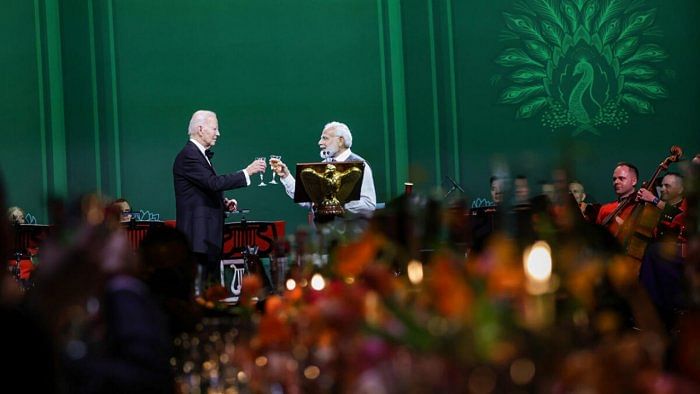
Aiming to clean the environment, India and USA have signed an agreement under which the USAID will support Indian Railways to achieve its target of becoming a net-zero carbon emitter by 2030.
In addition, the Joe Biden administration will facilitate the deployment of 10,000 made-in-India electric buses on Indian roads and work closely to develop small-scale modular nuclear reactors not only for operations within India but also to export.
The two initiatives are part of a series of climate change and clean energy programmes on which both sides have agreed to collaborate during the first state visit of Prime Minister Narendra Modi.
“The United States and India share a common and ambitious vision to rapidly deploy clean energy at scale, build economic prosperity, and help achieve global climate goals,” said a joint statement issued on Friday.
While the memorandum of understanding between USAID and Indian Railway was inked days before Modi’s arrival in the US capital, the two leaders welcomed a number of initiatives that New Delhi and Washington will undertake in the next few years to remove carbon dioxide load from the atmosphere.
Such initiatives include the creation of an India-US New and Emerging Renewable Energy Technologies Action Platform, which will accelerate cooperation in green hydrogen, offshore and onshore wind, and other emerging technologies.
A Global Biofuels Alliance with the United States as a founding member will be launched in July 2023.
The two countries have decided to collaborate on reducing the cost of green hydrogen under India’s National Green Hydrogen Mission and the US Hydrogen Energy Earth Shot. “The US welcomed India’s decision to co-lead the multilateral Hydrogen Breakthrough Agenda,” it said.
Under the India-US Climate and Clean Energy Agenda 2030 Partnership and Strategic Clean Energy Partnership, there will be joint efforts to develop and deploy energy storage technologies, including through the establishment of a new task force.
ON the USAID-Indian Railways agreement, the US Embassy in a statement said it was signed on June 14 by USAID Deputy Administrator Isobel Coleman and Indian Railways Board Member Naveen Gulati in the presence of the Chairman and Chief Executive Officer of Indian Railways, Anil Kumar Lahoti.
Under this MoU, the collective expertise, resources, and innovation of the two partners will be leveraged to accelerate the deployment of renewable energy, energy efficiency, and energy storage technologies, aligning with the net-zero goal.
Innovative investment platforms will be created to lower the cost of capital and attract international private finance at scale for renewable energy, battery storage, and emerging green technology projects in India. This first of its kind platform will create a multibillion-dollar fund aimed at providing catalytic capital and de-risking support for such projects.
Prime Minister Modi and President Biden underscored the important role nuclear energy plays in global decarbonization efforts and affirmed nuclear energy as a necessary resource to meet our nations’ climate, energy transition, and energy security needs.
To this they have decided to work closely on developing next generation small modular reactor technologies in a collaborative mode for the domestic market as well as for export.
